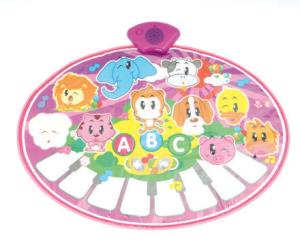
Develop social skills through play
There are a number of core skills to reinforce that enable your autistic child to be a better participant in his social world.
Joint attention
Help your child to focus on the task at hand. Use sensory cues to draw attention to the task at hand. For example, tap him on the arm, say his name and point your two fingers to your eye as a sign to “look”.
Shared enjoyment
Children often engage in activities they enjoy and have little tolerance for doing things which they have to do. Comment on your child’s enjoyment in the activity and verbalise and visually show yours. For example, laugh and smile and say to him, “It’s such fun to pop up the pirate.” If your child puts in the effort you request, reward this. Your child will learn an important lesson of life: “If I do what needs to be done now, I will get to do what I want to do afterwards.”
Encourage interaction by being playfully obstructive
If asking for a turn gets you nowhere, create an obstruction in a playful manner to make interaction with you unavoidable. For example, place your hand over a pop-up toy. If your child tries to peel your hand away, say, “Must I move?” Praise communication and interaction.
Promote imitation
Children learn more from what we do than from what we say, so maximise on imitation. Show your child different ways to play with the given toy and allow him time to copy this.
Making choices
Place a liked toy and non-liked toy on your play mat. Let your child select what you play with as this teaches him, on a concrete level, how to make decisions. Respect his choice. It helps your child understand his effect on the world. Upgrade the choices. For example two non-preferred toys and a preferred toy and later two preferred toys.
Turn taking
Teach your child about turn taking by expecting him to gesture his request for a turn by stretching out his hand, palm upward or by saying, “My turn”. If he finds this difficult to grasp or remember, place your hand over his hand and gesture with him. Reinforce his efforts. For example, place a sweet in his hand when he reaches out in gesture. You can also encourage him to ask for a turn by bringing the appropriate piece, such as a dice, close to him. This may entice him to reach for it.
How to get the most out of playtime
Use visual guides
Transition tools: Use visual props to lead into play. For example, if you want to start an activity like art, give your child a paintbrush and say, “Art time.” This helps him to understand what comes next and aids cooperation.
Trays: Place all the components of the planned task on a tray, such as the paint, paintbrush, water and paper. This enables your child to see what is expected of him. Autistic children find play hard work. Knowing what will come helps them to prepare for the demands of the activity.
Demarcated play area: Use a blanket or small carpet to define the boundaries of your play area. Knowing this is his play space makes him feel more secure and less anxious. If your child leaves the area don’t shout, “No,” and force him back. Go and engage with him and guide the object that grabbed his attention back to the play area. Say, “Let’s play this in the play area.”
Follow his lead
Utilise whatever your child indicates an interest in. Learning is maximised when the activity is perceived as meaningful and fun. To assist arousal, if your child appears under-aroused, become animated. If he is overexcited, adjust your voice to lower volumes and calming tones.
Structure helps to reduce anxiety
Use routine and structure at first. Introduce changes by making minor adaptations to the structure. Pick your battles. Select one change you want to make and focus on it. It’s best to choose the one which is causing the most concern in your child’s everyday life. Don’t make changes for the sake of getting him to adapt to them. If they are unnecessary to you, they are even more bizarre to him. For example, changing the route you drive to his swimming. That creates unnecessary anxiety.
She said...
“Never put a lid on potential,” says Sue Fowlds, Headmistress of Wiggle and Squiggles nursery school for children with special needs. Gains take time. Delight in each spontaneous contribution your child displays. The greater your patience, the greater the opportunity for him to fulfil his true potential.”
3 toys for social development
Bambolina – New Born doll (1041294)
Educational Interactive Learning – Animal Kingdom (1042159), Age 3+ years
Chat & Count Telephone (1048127), Age 18+ months
Products available as in October 2010. If discontinued, ask your toy dealer about similar toys.




 Publications
Publications
 Partners
Partners














